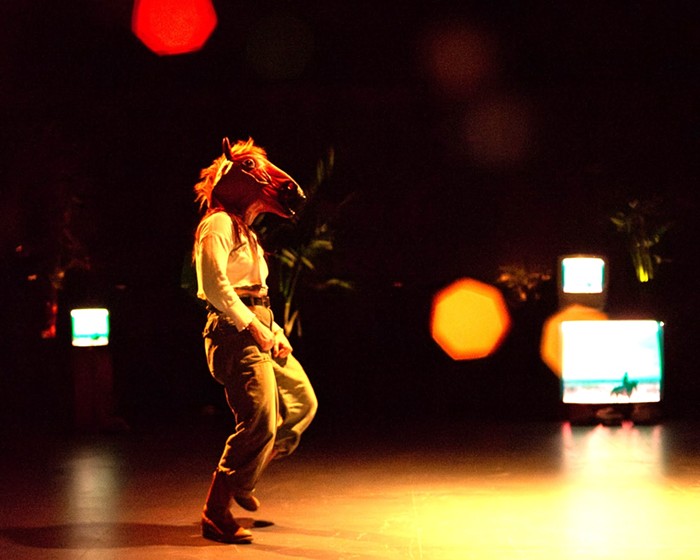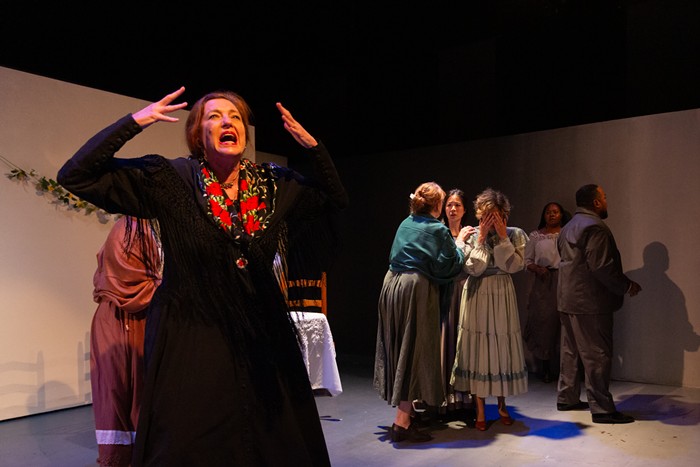WHILE FILM AND TV rarely acknowledge the existence of women over 40, theater often does better. Portland Playhouse's The Other Place is a testament to this. Sharr White's script focuses on Juliana, a middle-aged woman facing (or not facing, as the case may be) early-onset dementia. The first symptoms appear while she's giving a lecture on her pharmaceutical research, because Juliana happens to be a high-powered scientist studying the very disease she doesn't want to admit she has. Without giving too much away, The Other Place juxtaposes Juliana's disappearing memories with the veneer of autonomy: The tension between the Juliana seen giving that lecture and ongoing revelations about how little control she actually has over her life forms the play's central conflict. It's fascinating and suspenseful, and not at all the domestic drama I expected.
This is a welcome surprise, and so is the chance to see actor Sharonlee McLean in the lead role. McLean, who is roughly the same age as her character, makes pulling off Juliana's extremes—as well as her disarmingly self-effacing moments of lucidity—look easy. McLean's a seasoned pro, and a Portland theater mainstay. In January, she was excellent as a woman with a severe case of arrested development in Portland Center Stage's Vanya and Sonia and Masha and Spike. But Vanya and Sonia was an ensemble play that at times got bogged down in its own cleverness (sorry, Christopher During), so it's exciting to see McLean in a better play that puts her front and center.
Under the direction of Portland Playhouse Artistic Director Brian Weaver, the rest of the cast match McLean's excellence. As Juliana's long-suffering, eternally supportive husband (upending a role more often assigned to wives and girlfriends), Duffy Epstein radiates frustrated warmth. You might have seen him in Profile Theatre's production of True West—he played the rather nominal role of a slick Hollywood producer, and he did it well. But he's much better in The Other Place, perhaps because unlike Sam Shepard's archetypes, White's characters defy easy categorization. They're infinitely changeable and unreliable, adding to the play's overall sense of suspense and foreboding.
White's dialogue, too, is intermittently disturbing and darkly funny, propelled along by a heartbreaking through-line hinging on one of Juliana's dementia-based hallucinations. What begins as a source of confusion for her makes perfect, sad sense by the play's end. That said, there's one clunky misstep in the script, when Juliana compares her sadness to a Chinese prisoner having his limbs slowly amputated—but only being slowly murdered is like being slowly murdered, and McLean's Juliana is way too smart for a line like that.
That's no small quibble, but it's one I have with White's script, not with Portland Playhouse's production. Played by Nikki Weaver and Jean-Luc Boucherot, even the play's peripheral figures seem fully formed. Weaver and Boucherot fill in the story's many ancillary roles, creating distinct characters through short-lived appearances and small gestures so that the doubling-up of parts isn't distracting or even particularly noticeable.
What you will notice if you see The Other Place is its staging: Most of the action takes place on a simple raised platform, with sharp lighting and sound cues to differentiate between Juliana's lived experience and the dreamy other place she winds up falling into as her disease sets in. The simplicity of these cues doesn't diminish their effectiveness—in a split second, lighting designer Daniel Meeker and sound designer Peter Bayne shift between Juliana's façade of control and the cerebral, cordoned-off parts of her increasingly messy life. In moves like these, The Other Place reveals a woman whose mind is in crisis, and it's exactly as suspenseful and terrifying as it should be.



















